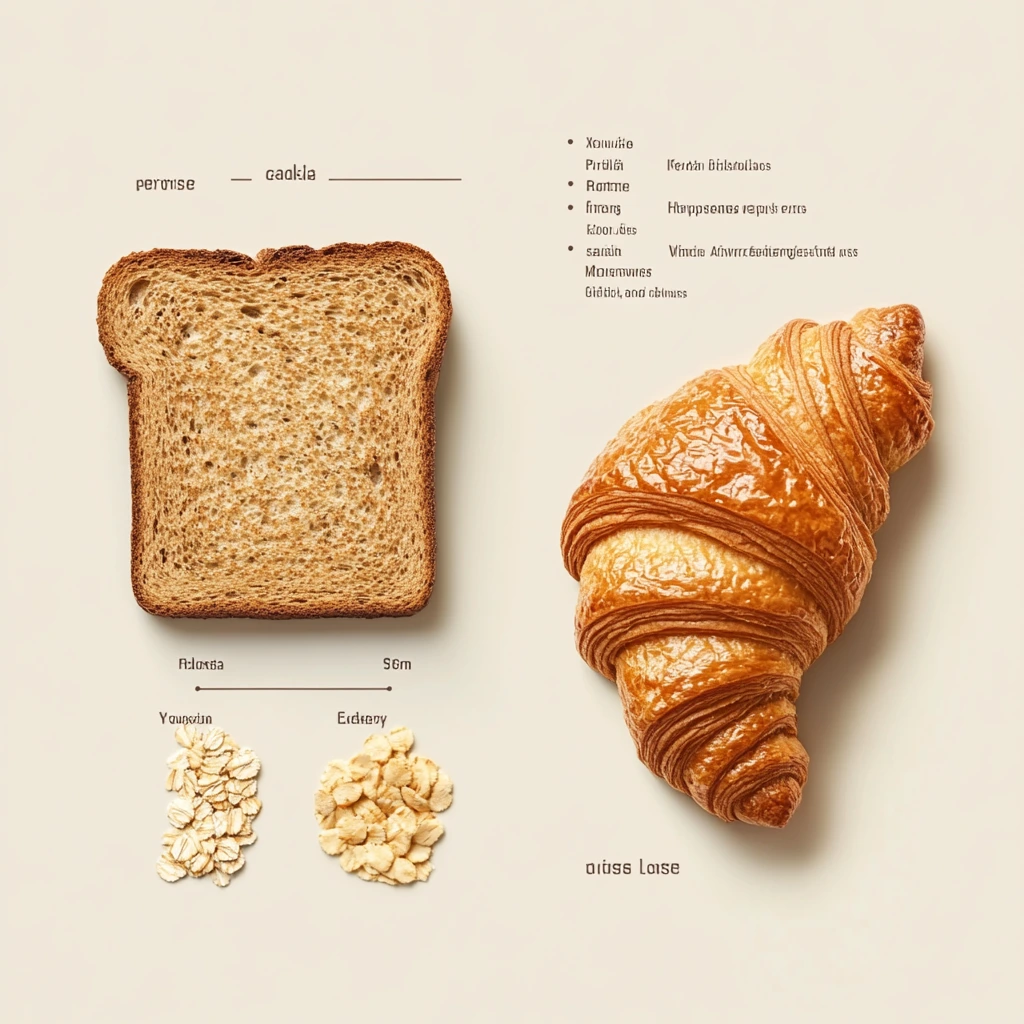When deciding what to eat for breakfast, the choice between toast and croissants often comes up. These two popular options are staples around the world, loved for their flavor and convenience. Toast, a versatile and simple choice, can be paired with a variety of healthy toppings, while croissants are known for their buttery, flaky layers that feel like an indulgence. However, when it comes to health, it’s important to ask: what’s healthier toast or croissant?
Understanding their nutritional differences is key to making smarter breakfast choices that align with your health goals. Whether you’re focusing on weight management, energy levels, or overall wellness, exploring the unique characteristics of toast and croissants can help you decide which is the better option for your lifestyle. In this article, we’ll dive into their nutritional profiles and health implications to help you make an informed decision.
Table of Contents
1. Nutritional Profile Comparison: What’s Healthier Toast or Croissant?
The nutritional differences between toast and croissants are significant and can influence which option aligns better with your health goals. Below is a detailed breakdown of their nutritional profiles, focusing on calories, macronutrients, fiber, and sugar.

1. Caloric Content: What’s healthier toast or croissant?
- Toast: A single slice of toast typically contains 70–120 calories, depending on the type of bread. Whole-grain and sprouted bread are generally lower in calories and more nutrient-dense than white bread.
- Croissants: A standard croissant contains around 250–350 calories, largely due to the butter and refined flour used in its preparation.
Key Implication: Croissants are much more calorie-dense than toast, making toast the better choice for those monitoring their caloric intake. Croissants should be enjoyed in moderation, especially if you are trying to lose or maintain weight.
2. Macronutrient Breakdown of Toast vs. Croissant
| Nutrient | Toast (1 slice) | Croissant (1 piece) |
|---|---|---|
| Carbohydrates | 12–15g | 28–35g |
| Proteins | 2–4g | 5–8g |
| Fats | 1–3g | 12–20g |
- Toast: Whole-grain toast provides complex carbohydrates and a small amount of protein, with very low fat content. This makes it a steady source of energy.
- Croissants: High in fats (mostly saturated) and refined carbohydrates, croissants offer quick energy but can lead to sugar crashes.
Key Implication: Toast, especially whole-grain, offers a better balance of macronutrients for sustained energy, whereas croissants provide a higher calorie, fat-heavy boost.
3. Fiber and Sugar: How Toast and Croissant Compare
| Nutrient | Whole-Grain Toast | White Toast | Croissant |
|---|---|---|---|
| Fiber | 2–4g | 1–2g | 0.5–1g |
| Sugar | ~1–2g | ~1–2g | 5–7g |
- Fiber: Whole-grain toast contains significantly more fiber than white toast or croissants, which supports digestion and helps you feel full for longer.
- Sugar: Croissants have higher sugar content, which can contribute to energy spikes and subsequent crashes.
Key Implication: Whole-grain toast is superior in fiber content, making it a healthier choice for digestion and satiety. The lower sugar levels in toast also contribute to better blood sugar control.
Summary
Toast, especially whole-grain, is a more nutrient-dense option, offering fewer calories, less fat, and more fiber than croissants. Croissants, while delicious, are better enjoyed occasionally due to their higher calorie and fat content. Understanding these differences helps you choose the option that aligns with your health and dietary goals.
2. Health Implications: What’s healthier toast or croissant?
Understanding the health implications of choosing toast or croissants can help you make informed decisions based on your dietary goals. This section examines the impact of these breakfast staples on weight management, cardiovascular health, and blood sugar control.
1. Weight Management: Toast or Croissant – Which is Better?
- Calorie Density: Croissants are significantly more calorie-dense than toast. A single croissant contains 250–350 calories, compared to 70–120 calories in a slice of toast. Choosing croissants regularly can contribute to a higher daily caloric intake, potentially leading to weight gain if not balanced with physical activity.
- Satiety Levels: Whole-grain toast is rich in fiber, which promotes a feeling of fullness and can help reduce overall calorie consumption throughout the day. Croissants, made with refined flour and butter, lack fiber and may leave you feeling hungry sooner despite their higher calorie content.
- Practical Tip: To manage weight effectively, opt for whole-grain toast with nutrient-dense toppings like avocado or nut butter. If you choose a croissant, go for smaller portions and pair it with protein-rich foods like eggs to increase satiety.
2. Cardiovascular Health and Your Breakfast Choice: Toast vs. Croissant
- Saturated Fats: Croissants are high in saturated fats due to their butter content. Regular consumption of saturated fats can raise LDL (bad cholesterol) levels, increasing the risk of heart disease. For individuals focused on heart health, croissants should be an occasional indulgence rather than a daily choice.
- Benefits of Whole-Grain Toast: Whole-grain toast contains heart-healthy fiber that helps reduce cholesterol levels and improve blood pressure. It also offers essential nutrients like magnesium and potassium, which are beneficial for cardiovascular health.
- Practical Tip: If you enjoy croissants, try balancing them with heart-friendly foods like fresh fruits or unsweetened yogurt. For a heart-healthy breakfast, stick to whole-grain toast paired with avocado, which contains monounsaturated fats.

3. Blood Sugar Control: Is Toast or Croissant the Healthier Option?
- Glycemic Index (GI): Whole-grain toast has a low glycemic index, meaning it releases glucose into the bloodstream slowly, providing steady energy without sharp spikes. White toast and croissants, made with refined flour, have a higher GI and can lead to rapid blood sugar increases followed by crashes.
- Sugar Content: Croissants often contain added sugar, which can exacerbate blood sugar fluctuations. In contrast, whole-grain toast has minimal sugar content, making it a better option for blood sugar control.
- Practical Tip: If you’re managing diabetes or aiming for stable energy levels, whole-grain toast is the better choice. Pair it with protein or healthy fats, such as almond butter or eggs, to further stabilize blood sugar levels.
Summary of Health Implications
Toast, particularly whole-grain, offers advantages in terms of weight management, heart health, and blood sugar control due to its lower calorie density, higher fiber content, and steadier energy release. Croissants, while indulgent, are best enjoyed occasionally and balanced with nutrient-rich sides to mitigate their high calorie, fat, and sugar content. By understanding these health implications, you can align your breakfast choices with your overall health and wellness goals.
3. Considerations for Dietary Preferences and Restrictions
1. Gluten Sensitivity and Celiac Disease
- Gluten Content:
- Both toast and croissants typically contain gluten, as they are made with wheat flour.
- Croissants use refined wheat flour, making them unsuitable for those with gluten sensitivity or celiac disease.
- Gluten-Free Options:
- Gluten-free bread is widely available as a substitute for toast. It’s made from ingredients like rice flour, almond flour, or quinoa.
- Gluten-free croissants exist but are less common and can be more expensive or harder to find.
- Takeaway:
- For individuals avoiding gluten, gluten-free toast is a more accessible and practical option compared to croissants.
2. Lactose Intolerance
- Dairy in Croissants:
- Croissants contain butter, making them unsuitable for those with lactose intolerance unless a lactose-free version is used.
- Dairy-Free Options for Toast:
- Toast can easily be made dairy-free by using plant-based toppings like avocado, nut butter, or hummus.
- Many breads are naturally dairy-free, but always check labels to confirm.
- Takeaway:
- Toast is a more flexible choice for those avoiding dairy, as it can be customized with lactose-free toppings.
3. Vegan and Vegetarian Considerations
- Animal-Derived Ingredients in Croissants:
- Traditional croissants are made with butter and sometimes milk, making them unsuitable for vegans.
- Vegetarians can consume croissants, but the high butter content may still be a concern for some.
- Vegan-Friendly Options for Toast:
- Many breads, especially whole-grain or sourdough, are vegan-friendly, but always check the ingredients for hidden dairy or eggs.
- Vegan spreads such as almond butter, jam, or tahini pair well with toast, making it a versatile choice for plant-based diets.
- Takeaway:
- Toast offers greater flexibility for vegans, with plenty of vegan-friendly bread and topping options available, unlike traditional croissants.
4. Enhancing the Healthiness of Your Breakfast Choice
1. Healthier Toast Options: Making Toast a Nutritious Choice
- Choose Whole-Grain or Sprouted Bread: Whole-grain or sprouted bread options provide more fiber, vitamins, and minerals compared to white bread. For inspiration on how to elevate your breakfast, you could explore ideas like those in “The Perfect Croissant French Toast”, which offers creative twists that might apply to your toast as well.
- Nutritious Toppings: Add nutrient-rich toppings such as avocado, nut butters, or fresh fruits to maximize the health benefits. For example, the suggestions in “What is the Best Bread for French Toast” could also inspire unique combinations for your toast.
2. Making Croissants Healthier: Tips to Balance Taste and Nutrition
- Opt for Smaller Portions: Reducing the portion size of croissants can help manage calorie intake. If you’re interested in gourmet options that balance indulgence and simplicity, check out “Irresistible Croissant Toast Bread: A Gourmet Twist”.
- Pair with Protein-Rich Foods: To enhance nutrition, pair croissants with protein-packed sides like eggs or yogurt. This can help balance their high carbohydrate and fat content.
3. Balancing Indulgence and Nutrition: Toast vs. Croissant in Moderation
- Moderation and Variety: Enjoy both toast and croissants in moderation while incorporating variety into your breakfast. For more ideas, consider recipes like “Easy Croissant French Toast” that combine croissants with healthier elements to strike a balance between indulgence and nutrition.
By thoughtfully selecting ingredients and considering portion sizes, you can enjoy your favorite breakfast while keeping health in focus.
5. (FAQs): What’s healthier toast or croissant?
Is it okay to eat croissants every day?
Eating croissants daily is not ideal due to their high calorie, saturated fat, and refined carbohydrate content, which can contribute to weight gain and cardiovascular issues if overconsumed. Moderation is key; enjoy croissants occasionally as a treat rather than a daily staple. Opt for smaller portions and balance them with nutrient-rich foods like fruits or protein to minimize their potential health impacts.
Can I make my toast or croissant healthier?
Yes, you can! For toast, choose whole-grain or sprouted bread and top it with nutritious spreads like avocado, nut butter, or fresh fruits. For croissants, opt for smaller servings, pair them with protein-rich sides, or try making whole-grain or lower-fat versions at home. Preparation methods and mindful ingredient choices can significantly boost the healthiness of both options.
Which is better for energy: toast or croissant?
Toast, especially whole-grain, is better for sustained energy due to its complex carbohydrates and fiber, which provide a steady release of glucose. Croissants, while high in carbs and fat, may cause quick energy spikes followed by crashes due to their refined ingredients. For long-lasting energy, toast is the more reliable choice.
6. Conclusion: What’s healthier toast or croissant?
Choosing between toast and croissants comes down to your health goals and preferences. Toast, especially whole-grain or sprouted, is a healthier option for everyday breakfasts. It’s lower in calories, higher in fiber, and provides steady energy. You can also make it more nutritious by adding toppings like avocado, nut butters, or fresh fruits.
Croissants, while delicious, are more indulgent. They are higher in calories, saturated fats, and refined carbs. This makes them better as an occasional treat rather than a daily choice. However, you can enjoy them more healthfully by opting for smaller portions and pairing them with protein-rich foods like eggs or yogurt.
The key is to make balanced choices that fit your needs. Whether you pick toast for a regular, wholesome breakfast or a croissant for a special treat, being mindful of portion sizes and ingredients helps you stay on track with your health goals. Remember, variety and moderation are essential for a happy, healthy breakfast routine.

